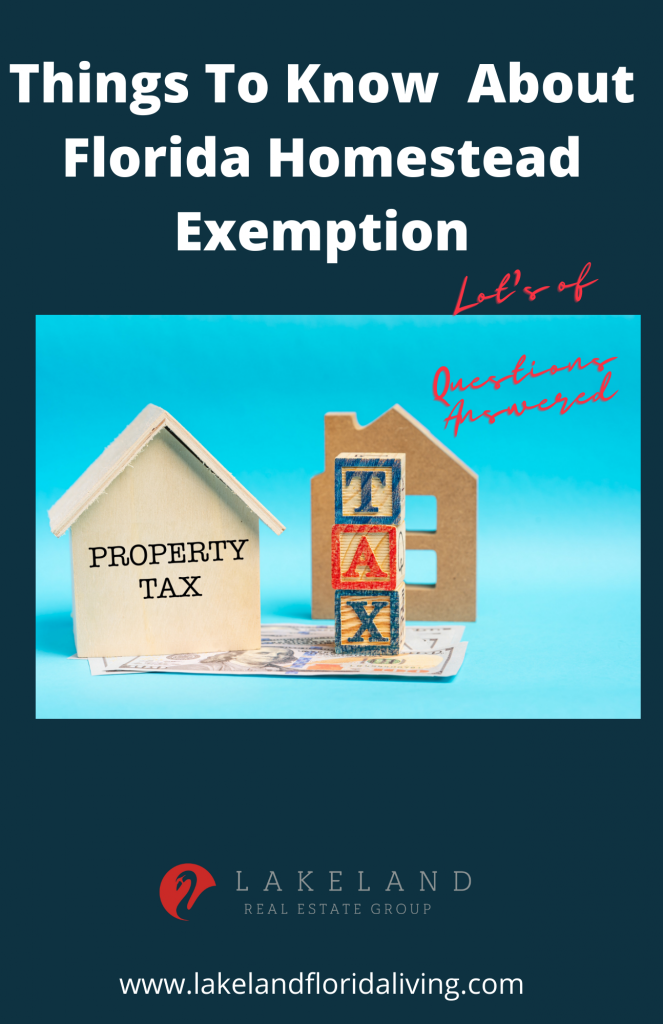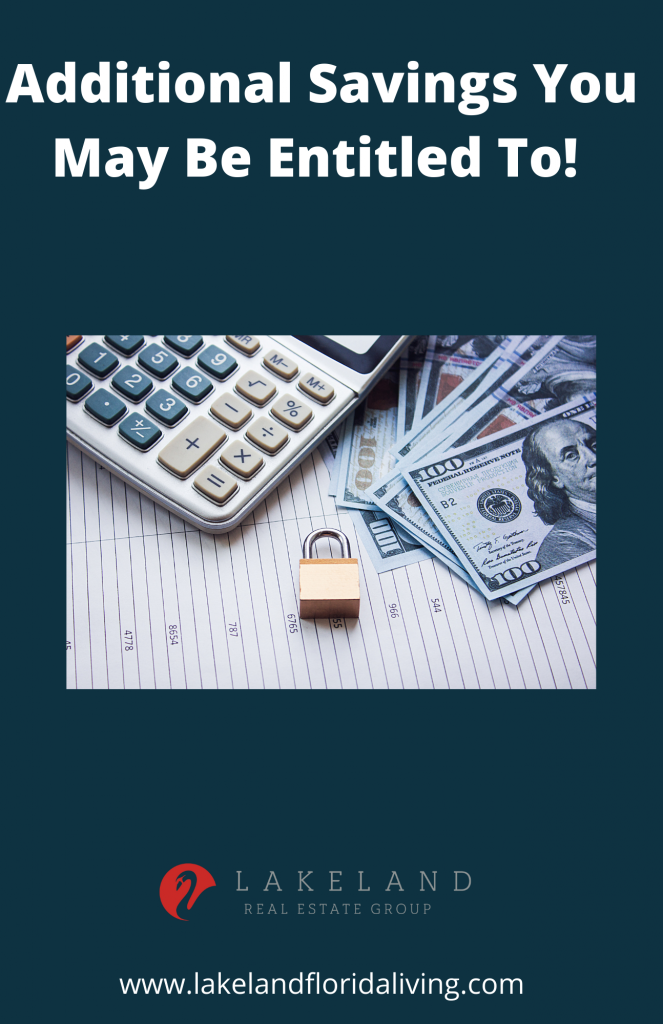If you have just purchased a home (or already have a home), you are probably thinking how wonderful homeownership is. And even though homeownership can seem expensive, it’s almost always cheaper and better than throwing your money away on renting a home you’ll never own. There is no greater gift than having a home to call your own.
But wouldn’t it be great if there was a way you could make owning your home a little cheaper?
There is and it’s called a homestead exemption. Keep reading, and we’ll tell you all about it.
What Is a Homestead Exemption?
A homestead exemption is a property tax exemption. The homestead exemption is a legal way to protect the value of your home from property taxes, creditors, and any other unforeseen circumstances such as the death of a spouse. Homestead exemption laws can be found within state statutes and constitutions.

What Does a Homestead Exemption Do for a Homeowner?
A homestead exemption is the exemption of property taxes on a home based on a dollar amount or percentage of a property’s value. That dollar amount or percentage is excluded when calculating any given home’s property taxes. This, in turn, lowers the homeowner’s property taxes every year until he or she moves. There are some requirements to claiming a homestead exemption though (more about that in a moment).
How Is a Homestead Exemption Calculated?
The way this works is that the dollar amount or percentage of any given homestead exemption is subtracted from the value of that home. The property taxes are then calculated on the remaining amount and that is the amount the homeowner will pay in property taxes.
For example (this is just an example for simplicity, not a true-to-life calculation):
Home Value = $200,000
Homestead Exemption Percentage = 50%
Homestead Exemption Amount = $100,000
Remaining Amount (remaining value of the home) = $100,000
The taxes due on this home would be calculated based on the remaining value of the home, which in this example would be $100,000.
But wait…there is more to it than that. Let me explain.
How Much Is the Homestead Exemption Amount in Florida?
The homestead exemption is calculated just as we explained above; however, this is how it’s broken down and applied.
Florida allows for up to $50,000 to be deducted from a home’s assessed value for a homestead exemption. There are some requirements for qualifying for a homestead exemption which we will talk about in a moment.
Here is the breakdown. A $25,000 exemption is applied to the first $50,000 (including school district taxes) of a home’s assessed value. That means the first $25,000 of a home’s value is entirely exempt. The remaining $25,000 of a homestead exemption applies to the value that is between $50,000 and $75,000 but does not include a benefit on the school tax.
Who Can File for a Homestead Exemption?
If your home is your permanent residence, and you owned your home as of January 1 of the current tax year, then you can apply for a homestead exemption. However, that home must be your primary residence. So, if you are a part-time resident of Florida, such as a snowbird, you would not qualify for a homestead exemption.
If you moved into your home after January 1 of the current tax year, then you will have to wait until the following year to apply for a homestead exemption. That means you will have to pay the full amount of the property taxes for the current year.
Do I Have to Reapply for a Homestead Exemption Every Year?
No. Your homestead exemption will automatically renew every year as long as you continue to qualify for the exemption. That means if you decide to rent out your home, that home is no longer your permanent residence, there is a change in ownership due to a sale, divorce, or death—in those circumstances, you would lose your homestead exemption benefit. Additionally, you are obligated to notify the state of those changes; otherwise, you could incur a homestead tax lien that accrues interest and comes with a substantial penalty.
However, a change in your homestead exemption status doesn’t always mean your property taxes will go up. Depending on the circumstances, you might have other options (more about that in a moment).
How Do I File for a Homestead Exemption in Florida?
There are several ways you can apply for a Florida homestead exemption in Polk County.
- E-File
- In-Person
- Fax
What Is Needed to File for a Homestead Exemption in Florida?
If your home is your primary residence, and you owned your home as of January 1 of the current year, then you are eligible to file for a homestead exemption. To file for a homestead exemption in Florida, you will need the following documentation to apply.
- A Florida state ID or a Florida driver’s license
- A Florida vehicle registration or proof of address
- Your Florida voter’s ID (if you vote)
- If you aren’t a U. S. citizen, you will need your immigration documents
What Is the Filing Deadline for a Homestead Exemption in Florida?
In Florida, the filing deadline for a homestead exemption is March 1 of each year. You must file for your homestead exemption by March 1 unless that day falls on a Sunday, in which case, you would have to file by March 2.
What Are the Benefits of a Homestead Exemption?
The main benefit of a homestead exemption in Florida is that you will pay less in property taxes. There is also what’s called a “portability” benefit which we will talk about in a moment. A homestead exemption will also protect a homeowner’s primary residence from creditor attachments, as well as applying special property tax exemptions and caps that are designed to help prevent a homeowner from losing their home due to rapidly increasing property values.
Additional Homestead Exemptions You Need to Know About
There are additional tax benefits for those who are elderly, disabled, widows, veterans, and first responders disabled in the line of duty.
Let’s break these down one by one.

In some Florida counties (and Polk County is one of them), the local governments allow an additional homestead exemption of up to $50,000 for the elderly. You have to be 65 or older, submit a statement of income, meet the income limit and have the legal right to the home of your permanent residence to qualify.
There are additional homestead exemptions for those with various disabilities. These benefits range from $500 to a complete exemption from paying property taxes depending on the disability.
There is an additional $500 homestead exemption for widows and widowers. However, if you remarry, you lose that exemption. Additionally, if you were divorced before the death of your spouse, you won’t qualify for this benefit.
There are specific homestead exemption benefits for different situations. These exemptions are for Florida homeowners who are first responders disabled in the line of duty, deployed service members, or veterans of the U.S. military who were honorably disabled while in service.
What Is the Save Our Homes Program?
The Save Our Homes (SOH) program was approved by voters in 1992. It is an amendment to the Florida Constitution. This amendment is known as Amendment 10. SOH limits the increases to a homesteaded property to 3% or however much change there is in the Consumer Price Index (CPI), whichever is less. This increased cap starts at the beginning of the year after your homestead exemption is granted.
Before the Save Our Homes program, if your home’s value increased, the taxes were calculated on the new value regardless of how much it went up. And because oftentimes the value of homes increased so much year over year, it was causing some people to lose their homes because they couldn’t afford to pay the new higher monthly mortgage payments. The Save Our Homes program limits this from happening because it caps the taxable amount of the market value of your property to 3%.
This SOH benefit on your homestead exemption stays with your property indefinitely or until there is a change in ownership or other disqualifying homestead exemption action. However, if you have major property improvements done, this could also change the amount of property taxes you have to pay. This is because with the property improvements, your home will be worth more and, therefore, the market value will be higher resulting in higher property taxes.
What If the Previous Homeowner Had a Homestead Exemption?
A homestead exemption will always belong to the homeowner who filed for it. That means a homestead exemption is not transferrable from one homeowner to the next homeowner. Therefore, anytime a home is sold or otherwise conveyed to a new owner, the homestead exemption is removed. The new homeowner must then qualify, apply for, and receive their own homestead exemption for that property based on their own qualifications for such.
Which Types of Property Would Not Be Eligible for the SOH Cap?
Any non-homesteaded property such as a residence that’s not eligible for a homestead exemption, vacant land, commercial property, etc. would not receive the benefit of the 3% SOH cap. This also applies to tangible property, agricultural property, and any homesteaded property that has been sold or conveyed to a new owner during the current calendar year.
How Does Florida Homestead Exemption Portability Work?
Florida Homestead Portability is another benefit that comes with your homestead exemption. This benefit known as portability lets a homeowner with a homestead exemption on their home take their current accumulated Save Our Homes benefit up to $500,000 with them when they move to a new home. The only caveat is that the homeowner must file for a homestead exemption on their new home within three years of moving from their old home.
The amount of this benefit that can be transferred will depend on the just value of the homeowner’s new home, and it can’t exceed $500,000. A homeowner can apply for this benefit the same way as he or she would apply for any other homestead exemption which is in person, by mail, fax, or email.
Additionally, you will still need to show the same types of proof of residency which could include a Florida driver’s license, a current utility bill, a current bank statement, etc. And once this homestead exemption benefit is transferred, it doesn’t have to be renewed.
Click Here for a more detailed explanation of how portability works and a PDF that provides a great overview that makes this concept easier to understand.
Additional Resources for Property Taxes and other Savings
Let’s take an in-depth look at what a property owner needs to do to start the process of a property tax assessment appeal writes Bill Gassett in his article.
Homeownership also conveys many different tax advantages that are not available to renters and can help you save big when it comes time to file your taxes at the beginning of the year, explains Paul Sian in his article.
What’s Next?
If you have questions about homestead exemptions or anything other real estate matters, please don’t hesitate to Contact Lakeland Real Estate Group. We are respected members of the community and have been helping people buy and sell their homes from here and afar for many years, and we’d love to do the same for you!
About the author: The above real estate article “Must-Know Facts About Florida Homestead Exemptions” was written by Petra Norris of Lakeland Real Estate Group, Inc. With over 20 years of combined experience of selling or buying, we would love to share our knowledge and expertise. Petra can be reached via email at petra@petranorris.com or by phone at 863-712-4207
We service the following Central Florida areas: Lakeland, Auburndale, Mulberry, Winter Haven, Bartow, Plant City, Seffner, Valrico, Polk City, Lake Alfred, Lake Wales, Haines City, and Davenport FL.
Well-written post for those who are considering making Florida their home of record.